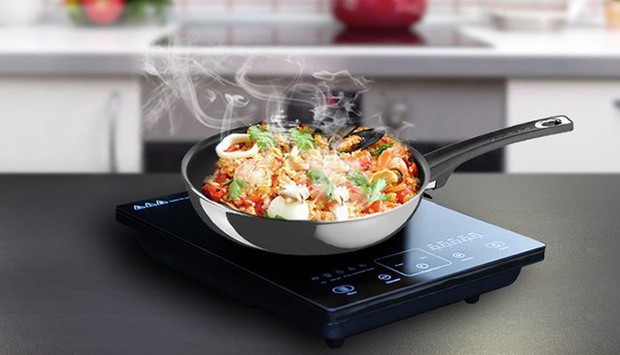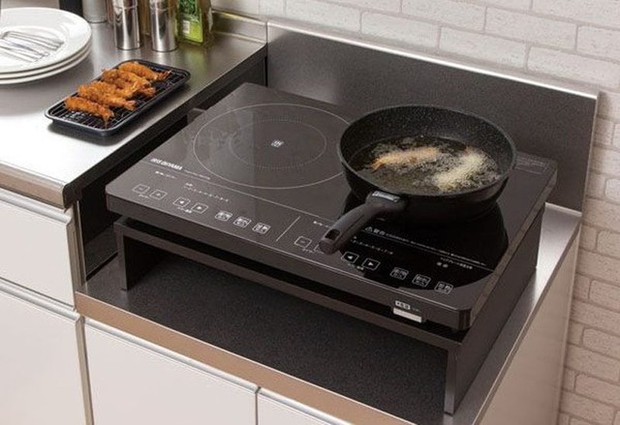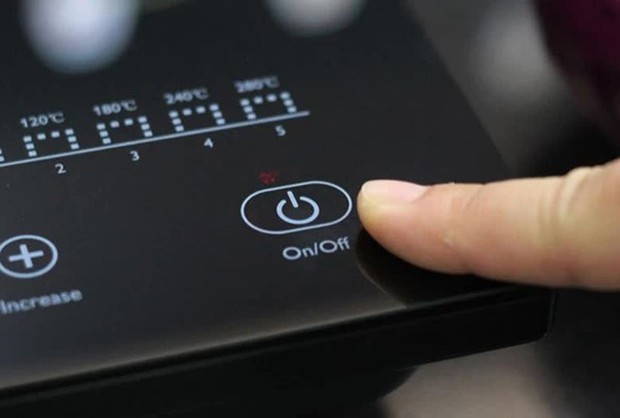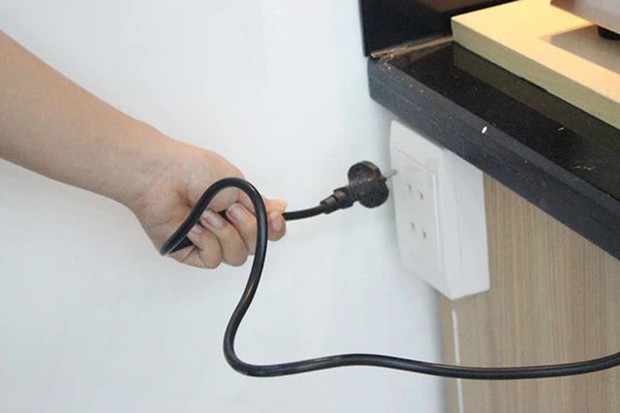In modern family life, it can be said that household electrical appliances are indispensable. These devices support and help save time and effort in household chores. However, during use, some of them can cause troubles or accidents. The following case is an example.
According to a social media account on a forum, a family’s induction cooker exploded while the person was using it. Fortunately, only the appliance was damaged, and no one was affected or injured.

The family’s induction cooker exploded, shattering the glass surface (Photo: Hanh Karate)
In reality, induction cookers exploding or catching fire during use is not uncommon. According to the owner’s sharing, this cooker was newly purchased and had been used for only 3 months. In 2019, a user from Ninh Binh shared that their induction cooker exploded after just 4 days of use.
The cooker malfunctioned and shattered while it was being used for cooking. Luckily, there was no one near the cooker at the time, so there were no injuries. “I was boiling water spinach on the cooker when I heard a loud bang. When I ran there, I saw the water spinach splattered everywhere, and the surface of the cooker was cracked and all the internal components were exposed,” the user recounted.
According to experienced experts in the household appliances field, inductions cookers, electric cookers, and infrared cookers can encounter malfunctions during use, and there can be several causes. The majority of these causes are related to the user’s daily habits. Additionally, the origin and quality of the appliance can also contribute.

Induction cookers exploding in reality is not an uncommon occurrence (Illustrative photo)
Causes of induction cookers catching fire or exploding:
1. Overloading
The first and most common cause is overloading. This means that the induction cooker has been continuously operating at a high intensity without any rest time for heat dissipation. Consequently, the temperature of the cooker, especially the cooking surface, remains high.
Over time, this high temperature can cause the cooker to explode. If it doesn’t explode immediately, the lifespan and efficiency of the cooker will be reduced. Therefore, families should not let the induction cooker operate continuously at high temperatures for a long period of time. After approximately 30-60 minutes of operation, it is recommended to turn off the cooker for about 5-10 minutes to allow for a resting period and heat dissipation.

Induction cookers need resting periods to dissipate heat (Illustrative photo)
2. Improper positioning
The second cause is when users place the induction cooker in an unsuitable location. This often happens with surface type induction cookers that are not built into kitchen cabinets. Unsuitable positions can include being too close to the wall, other electrical devices, or heat-emitting sources, or being too close to water sources.
Being too close to the wall can obstruct the circulation and heat dissipation of the cooker. Therefore, experts recommend that users should place the induction cooker about 5-10cm away from the wall. When multiple heat-emitting devices are placed together, the temperature can rise to a dangerously high level, posing a fire and explosion risk. Regarding water sources, water can cause short circuits or electric shocks.
Therefore, the ideal position for families using surface type induction cookers is on a flat surface, in a well-ventilated and dry location. Only with these conditions can the cooker operate efficiently and safely.

Surface type induction cookers should be placed in well-ventilated and dry locations, with some space around to dissipate heat (Illustrative photo)
3. Incorrect use of control buttons
Modern induction cookers are often controlled and adjusted using electronic buttons, directly on the surface of the cooker. However, using these buttons improperly can pose a high risk of explosions or electrical malfunctions.
In particular, according to experts, users should not press the buttons continuously or frequently change the settings or temperature of the cooker. Doing so can disrupt the control circuit of the appliance, leading to overload and dangerous sparks or explosions.

Illustrative photo
4. Unplugging the cooker immediately after use
Another common mistake that users make, which can lead to induction cookers exploding, is unplugging the cooker immediately after use. When the induction cooker finishes its operation, it is still hot and some internal components are still running.
Unplugging the cooker abruptly can stop the operation of these components suddenly, posing a high risk of explosions. Therefore, if users want to unplug the induction cooker, they should wait for about 10-15 minutes for the cooker to cool down before performing the action.

Illustrative photo
Besides these main causes related to user habits, experts also point out other objective causes such as unstable household electricity, the cooker’s power not being compatible with the household voltage, or the product having pre-existing faults that were not repaired in time, etc.
If an induction cooker experiences explosions or electrical malfunctions, regardless of the severity, users should immediately stop using it. Afterwards, they should contact technical experts for inspection, repair, or replacement if necessary.
Source: Đời Sống Pháp Luật
2. Improper positioning: Placing the cooker too close to walls, other electrical devices, heat-emitting sources, or water sources can obstruct ventilation and heat dissipation, increasing the risk of fire or explosion.
3. Incorrect use of control buttons: Frequently changing settings or temperatures, or pressing buttons continuously, can disrupt the control circuit, leading to overload and potential sparks or explosions.
4. Unplugging immediately after use: Abruptly unplugging the cooker while it is still hot and internal components are running can pose a high risk of explosions.





































